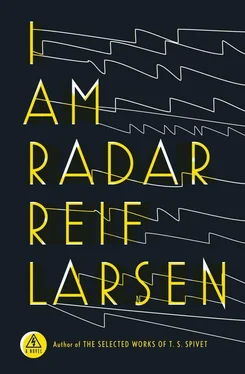Once settled into their new home, they enrolled Radar in a local day care. For the first time since his birth, Charlene felt comfortable enough to release him into the care of others.
“He must meet friends, kids, boys, everyone,” said Kermin. “So he can be normal.”
The day care was a brick-and-pastel compound called Shady Dale Tots. The playground out front was padded. There were two neon turtles you could ride like ponies. The adults at Shady Dale Tots cooed and pinched Radar’s cheeks. After his first day, Radar asked Charlene why there were no doctors, only other kids like him.
Her newfound free time terrified her. In the mornings, she would often sit with a copy of the Star-Ledger, a perpetually disappointing, perpetually comforting cultural artifact, reading and half reading, taking little sentence-long sips from stories that outlined the misfortunes of others. One morning, after burning clear through the local news, Charlene suddenly found herself in the classifieds — rare territory she usually found a touch gauche, a touch desperate even for her tastes. ( Who would go public with something like that? ) But now, faced with these crowded columns of informal commerce, she found herself voyeuristically scanning the personals and job listings and for-sale items. A thousand potential worlds awaited her attention. The personals were particularly mystifying, for the carefully ascribed acronyms and decontextualized details (“SWDM, 58 seeks SWF for LTR. I’m a Catholic-turned-atheist”) made each sound like an encoded diplomatic cable rather than an intimate come-on. In some ways, their impossible brevity reminded her of the obituaries that she had once collected as a child, but these missives were not meant to memorialize a life gone by. The personal ads had been crafted by living, breathing people who were awaiting actual responses. Their summary was like a death before death.
It was then that her eyes fell upon a nondescript ad in the bottom right-hand corner of the page:
DO YOU HAVE A SENSITIVITY TO TASTE AND/OR SMELL?
The International Flavor and Aroma Corporation of Elizabeth, NJ is looking for select, qualified candidates for several entry-level flavorist, perfumer, and quality control positions. Industry and/or science background helpful but not necessary. Apply to: IFAC H&R, PO Box 4923, Elizabeth, NJ 07207
Charlene read the ad twice through and then once more. She took a pair of scissors and carefully cut it out with four neat little snips. When she was done, the slip of newspaper lay by itself on the table. She fetched a piece of paper, fully intending to respond, but when she tried to write a reply, she found she had nothing to write. After several attempts, she gave up. She hid the ad inside a recipe booklet and tried to forget she had ever seen it.
Still, she realized she needed to find some type of job. Kermin’s business was floundering, and even with the financial assistance of her parents (who were incidentally also paying for Radar’s day care), they were in increasing need of a steady source of reliable income. Maureen, mother of Bryan, one of Radar’s day care buddies, found Charlene a position as a part-time receptionist at the semi-upscale hair salon where she worked. The pay wasn’t much, but it kept her busy.
One day at day care pickup, Charlene and Maureen lingered, chatting. Maureen was quietly becoming one of her few confidants. Close female friends were unusual for Charlene, who naturally drifted toward the gruff honesty (and the associated sexual complications) of male companionship. But Maureen was perky and kind and eternally optimistic — everything that Charlene was not.
“I was all, ‘If you try that again, we’ve got a problem,’” Maureen was saying. “You know what I mean, honey? You just can’t take that from people.”
Charlene, half listening, watched the children. She was aware — not for the first time — of their incredible whiteness. They appeared almost sickly under the fluorescent lights, as if they had never been exposed to the sun. The boy with the bowl cut whose name she could never remember was playing a block game with Bryan. Radar sat in his usual spot in the corner, contentedly rewiring one of his radios. At first the teachers had frowned upon having such dangerous elements in the classroom, but when they witnessed the degree to which Radar was consumed by his electronics, they had reluctantly made an exception.
And then Charlene saw the boy with the bowl cut stop and point at Radar. He was pointing right at him. The boy said a word — she couldn’t hear what it was, but his face had twisted into a scowl when he said it, giving him a momentarily precocious air of menace. Charlene stood and stared at the boy thrusting his finger in the direction of her son.
That little shit.
She resisted the urge to go over and slap him. Why on earth was he pointing like that? What had he said about Radar?
“Charlene? Are you okay?” asked Maureen. “What is it?”
The boy was pointing, and now he was saying something to Bryan, next to him, and they were both laughing and kicking at the blocks with their little feet. Charlene could not believe it. Bryan was laughing, too. Bryan was supposed to be Radar’s friend.
“They’re laughing at him,” said Charlene.
“At who?”
But Charlene was already running over. She grabbed the boy’s hand.
“Never,” she hissed at the boy. “ Never, ever do that . Do you hear me?” The boy looked bewildered for a moment and then began to cry. Charlene plucked up Radar and hurriedly left the room.
“Wait, Charlene! What happened?” Maureen called after her, but she did not stop. She ran to the car and did not bother putting Radar in his car seat before driving away.
• • •
SEVERAL WEEKS LATER, perambulating Radar down Harrison Avenue, Charlene was lost in thought when she felt the baby carriage hit something. She looked around and saw a black couple in their seventies standing next to her. The man was holding the chassis of Radar’s carriage. Beneath a battered newsie cap, he studied Charlene with sad, elephant eyes magnified by a thick pair of grubby eyeglasses. His knuckles were dry and white with age.
“I’m sorry,” said Charlene, thinking she must’ve clipped them by accident. She tried to push forward but could not break free from the old man’s grip.
“Herb!” His wife grabbed his arm and tried to pull it off the stroller.
He pushed her away and lifted a finger at Charlene.
“You got some nerve, you know that?” His voice like a memory, pressing against her chest.
“Herb!” his wife said again. She uncoiled his fingers from the carriage. “I’m so sorry. He doesn’t know what he’s saying these days.”
She took out a handkerchief and wiped his nose. “Come on, love,” she said. “Let’s go get you some goulash.”
Charlene was paralyzed.
“It’s not what you think,” she finally stammered.
The woman turned and placed her hand on Charlene’s arm. Her eyes were warm.
“I think it’s wonderful what you’re doing, really. God bless,” she said. “So many out there who need good homes, no matter what color they is.”
• • •
THE ENCOUNTER DOGGED HER. It filled the folds of her consciousness. She kept seeing those cataract eyes, large and unblinking behind his Coke bottle glasses. A soft man filled with such malice. She wished she had confessed all to this couple, explained to them what had happened and why, sought their advice, sought their forgiveness. On more than one occasion, she found herself back at the place of their encounter, hoping she might run into them again.
She had always struggled with insomnia, but now she stopped sleeping altogether. After consulting a doctor, she began relying on an array of potent sleeping pills. If she did not take enough, she would not sleep and would wake up nauseated, tired, and depressed. If she took too many, she would pass out and wake up nauseated, tired, and depressed. Every night became an exercise in threading the needle. Days began to blur together.
Читать дальше












